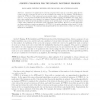Free Online Productivity Tools
i2Speak
i2Symbol
i2OCR
iTex2Img
iWeb2Print
iWeb2Shot
i2Type
iPdf2Split
iPdf2Merge
i2Bopomofo
i2Arabic
i2Style
i2Image
i2PDF
iLatex2Rtf
Sci2ools
JDA
2010
2010
Greedy colorings for the binary paintshop problem
Cars have to be painted in two colors in a sequence where each car occurs twice; assign the two colors to the two occurrences of each car so as to minimize the number of color changes. This problem is denoted by PPW(2, 1). This version and a more general version – with an arbitrary multiset of colors for each car – were proposed and studied for the first time in 2004 by Epping, Hochst¨attler and Oertel. Since then, other results have been obtained: for instance, Meunier and Seb˝o have found a class of PPW(2, 1) instances for which the greedy algorithm is optimal. In the present paper, we focus on PPW(2, 1) and find a larger class of instances for which the greedy algorithm is still optimal. Moreover, we show that when one draws uniformly at random an instance w of PPW(2, 1), the greedy algorithm needs at most 1/3 of the length of w color changes. We conjecture that asymptotically the true factor is not 1/3 but 1/4. Other open questions are emphasized.
| Added | 28 Jan 2011 |
| Updated | 28 Jan 2011 |
| Type | Journal |
| Year | 2010 |
| Where | JDA |
| Authors | Hadis Amini, Frédéric Meunier, Héloïse Michel, Atefeh Mohajeri |
Comments (0)

